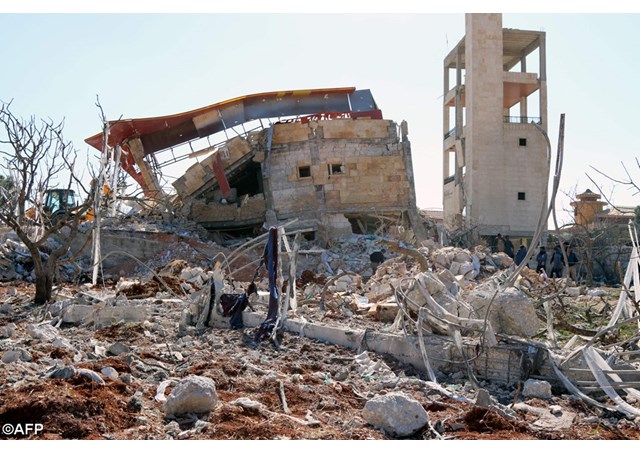
MSF: disregard for Humanitarian Law in Syria an attack on humanity

(Vatican Radio) Up to 50 people were killed in missile attacks on at least four hospitals and a school in rebel-held areas of northern Syria on Monday.
The UN said "intentionally directing attacks" at hospitals and medical units would constitute a war crime.
Missiles struck two hospitals and a school sheltering internally displaced people in Azaz near the border with Turkey killing at least 34 people.
Two hospitals were also struck in Maarat al-Numan, further south killing at least 12 people and wounding many more.
One of the hospitals in Maarat al-Numan - in which at least 11 people were killed and more are missing and presumed dead - was supported by the international humanitarian organization Medecins Sans Frontiers – or Doctors Without Borders.
It was reportedly struck by four missiles in what MSF said was "direct targeting."
André Heller Pérache, Head of the Programmes Unit at MSF UK, told Vatican Radio’s Linda Bordoni that beyond causing tragic loss of life, the destruction of hospitals and other public infrastructures in Syria has far reaching consequences for the suffering civilian population as well as other serious implications:
Heller Pérache explains that four missiles struck the Hospital in Ma’arat Al Numan in Idlib Province in two successive waves of airstrikes within ninety minutes completely demolishing the building.
He says that MSF is certain that seven people were killed in the attacks and that eight MSF colleagues are missing, presumed dead underneath the rubble.
MSF is not sure if other patients who would have been in the hospital when it was struck may have escaped before it collapsed or if they were killed as well.
Beyond that – he says – there were some 15 structures surrounding the hospital (homes and other small buildings) that were damaged or destroyed as a result of the airstrikes as well.
“What this means is that a hospital with 30 beds, 2 operating theatres, an emergency room and an outpatient department are completely destroyed” he said.
Heller Pérache says that previously the hospital was treating around 1,500 people a month, about 1,100 emergency cases per month in the Emergency Room, and performing about 140 surgical interventions a month in the operating theatres.
“So it has now left the population of around 40,000 people without access to emergency health care in a time of great crisis” he said.
He comments on the fact that while the loss of life of colleagues and patients is tragic, the bombing also has a huge impact on the surrounding population that relied upon the services provided.
Heller Pérache also highlights the fact that the destruction of hospitals, health care facilities and vital infrastructure in Syria has been a feature of the conflict ever since it began.
“You have bakeries, grain silos, water-pumping stations, schools, health facilities… consistently destroyed throughout areas that are fighting and what this means – estimates vary – the World Health Organization claims that 60% of the public hospitals in the country have been destroyed; another organization – Physicians for Human Rights – has the figure of 240 hospitals that have been damaged or destroyed in air strikes, and over 700 medical workers confirmed killed” he said.
So, pointing out that there are some 6.5 million people displaced within the country and 2 million who have exited Syria and over 1.5 million people living in besieged areas of the country right now, Heller Pérache says the impact of this conflict is massive, “beyond anything we can comprehend”.
“All we can do as an organization – MSF – is endeavor to continue helping people as much as we can but the horror of the situation that people inside Syria are facing is beyond anything we can grasp” he said.
He points out that from a humanitarian perspective it is the most abysmal situation of this era and it seems somehow to get worse and worse.
From an organizational point of view, Heller Pérache underlines the fact that most of the work that MSF does is actually to offer support to networks, and he says Syrian doctors and aid workers are the ones who are delivering care on the ground.
He explains that there are aspects that render very complicated the possibility of having international teams present in the conflict zone.
He says the people “who are risking their lives every day offering help care – for example – are Syrians themselves, and they need our help, and we endeavor to provide as much as we can in a neutral and impartial way”.
He says they are the real heroes in this story.
One point Heller Pérache stresses is that an incredibly high number of protected spaces – buildings or places that have been clearly designated as protected areas by International Humanitarian Law- have been destroyed.
“This has been happening as a regular feature of this conflict since the beginning. It’s almost as though humanitarian law is somehow disregarded to such a degree in Syria that it seems to have lost its meaning for the belligerent parties” he said.
He says that this fact should be a shock to the entire world – not just to aid agencies.
“While an innocent person can be killed in a protected space, it shatters that life and the life of families and friends, but really: this is an attack on all of our humanity” he said.
| All the contents on this site are copyrighted ©. |


